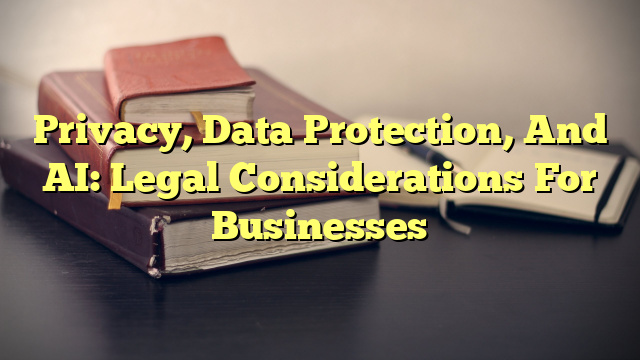Introduction
Artificial Intelligence (AI) has become an ever-growing field of technology with the potential to revolutionize business operations. As AI is increasingly used in the workplace, it is important to understand the legal and ethical implications that come with the use of AI in terms of data privacy and security. This article will provide an overview of the legal considerations for businesses using AI, as well as the potential implications and ethical considerations for AI privacy.
Overview of Privacy and Data Protection Laws
Data privacy laws vary from country to country, as well as by region and state. In the United States, the primary laws governing data privacy and security are the Health Insurance Portability and Accountability Act (HIPAA), the Health Information Technology for Economic and Clinical Health Act (HITECH), and the Children’s Online Privacy Protection Act (COPPA). These laws provide regulations on how companies must protect customer data, such as how long data can be stored, and who has access to the data. Additionally, the European Union’s General Data Protection Regulation (GDPR) provides extensive regulations for the protection of personal data and data privacy across the European Union.
What are the Privacy and Security Concerns with AI?
When using AI technology, companies must be aware of potential security and privacy issues. As the technology is still relatively new, there are still many unknowns about how it will be used and how it will impact data privacy and security. One of the major concerns is that AI algorithms may be used to collect and store large amounts of customer data, which can potentially be used for malicious purposes. Additionally, AI algorithms can be used to track user behavior and personal preferences, which can be used to target users with specific advertisements or content.
Another concern is the potential for discrimination. Many AI algorithms are based on complex algorithms that may unintentionally discriminate against certain groups of people, such as minorities, those with disabilities, or those with low incomes. Additionally, algorithms may lead to biased decision-making, such as in hiring decisions. It is important that companies understand the potential implications of AI algorithms and take steps to ensure that they are not unintentionally discriminating against certain groups.
What are the Legal Issues for AI?
One of the key legal issues for AI is data protection. As mentioned above, many countries have regulations or laws governing how companies must protect customer data. Companies must ensure that they are compliant with all relevant laws and regulations when using AI. Additionally, companies should be aware of the potential ethical implications of using AI, such as the potential for discrimination.
Another important legal issue is intellectual property. AI algorithms are often based on complex algorithms that are created by developers, and companies must be aware of the potential for legal action if they are using algorithms that are not their own. Companies should also be aware of potential copyright issues when using AI, as some algorithms may be based on existing works.
How AI Can Help in Personal Data Protection and Privacy
AI can be used in a number of ways to help protect personal data and privacy. One way is through the use of data anonymization. Data anonymization is the process of removing all personally identifiable information from data sets, making it impossible for the data to be traced back to an individual person. Additionally, AI can be used to identify potential data breaches and alert companies of potential threats before they occur.
AI can also help companies ensure that they are compliant with data privacy regulations. Companies can use AI to identify areas in their processes or systems that are not compliant with data privacy regulations, and take steps to ensure that they are compliant before any fines or penalties are issued. Additionally, AI can be used to monitor employee behavior to ensure that employees are not accessing or sharing customer data without permission.
What are the Ethical Issues with AI Privacy?
The use of AI raises a number of ethical concerns in terms of data privacy. As AI algorithms can be used to collect and store large amounts of data, companies must be aware of the potential for misuse or abuse of the data. Additionally, AI algorithms can be used to track user behavior and personal preferences, which can be used to target users with specific advertisements or content. Companies must be aware of the ethical implications of using AI and ensure that they are not misusing the data.
Additionally, many AI algorithms are based on complex algorithms that may unintentionally discriminate against certain groups of people, such as minorities, those with

